ERP Pricing Calculator
Use our ERP pricing calculator to get a ballpark cost based on your company’s profile.

An Enterprise Resource Planning (ERP) system is designed to manage all aspects of a manufacturing business, including production, planning, purchasing, manufacturing, sales, distribution, accounting, and customer service. ERP software is invaluable for manufacturers of all sizes — including small businesses — as this fully integrated system provides a comprehensive view of business operations.
By enhancing communication across departments and integrating production, financial, and customer information into a single platform, ERP software allows small businesses to streamline operations, optimize business processes, and make more informed decisions to move their businesses forward.
No business is too small for an ERP solution. A common misconception is that ERP systems are only for large-scale enterprises, but their benefits extend to businesses of all sizes. Although ERP systems were initially designed for large organizations, they offer significant advantages for small businesses as well.
By integrating all business processes and data into a unified system, ERPs help streamline production and enhance overall efficiency. This allows small businesses to operate with the same level of efficiency and effectiveness as larger enterprises.
Connect all departments, facilitating easy data sharing and streamlining processes across your organization.
Automate processes, eliminate redundant tasks, and enhance shop efficiency to boost productivity without additional hires or expanded operations.
Accurate real-time data, reporting and business intelligence tools track progress, productivity, and performance, providing valuable insights for better decision-making.
Streamline your tasks and processes to enable faster, better, and more consistent work. Enable your employees to complete their work more quickly and accurately.
If you think your business is too small for an ERP, think again. Over 75% of small companies use ERP systems to manage their operations. Even in small-scale manufacturing, data is abundant. An ERP system can help you organize and make sense of this data, streamlining operations and improving efficiency, regardless of your business size.
To run a profitable business, you need to manage your resources—cash, raw materials, personnel, and production capacity—effectively. With the visibility an ERP system provides, you can easily track performance metrics through real-time dashboards. This comprehensive overview helps optimize production schedules, maximize capacity, and increase throughput. Additionally, an ERP system enhances operational efficiency by enabling easy information sharing and collaboration between departments.
One of the greatest advantages of an ERP system is its ability to provide complete visibility of your entire operation, offering valuable insights into performance. Tasks that once required hours of meticulous data collection and report creation are now automated, delivering a comprehensive overview and allowing you to measure critical performance metrics. This constant flow of information helps you understand your operations better.
Use our ERP pricing calculator to get a ballpark cost based on your company’s profile.

Finding the right ERP for your small business is all about fit. The ideal ERP solution depends on your industry, size, budget, and specific needs. A system designed for a multinational corporation may not be suitable for a small or medium-sized enterprise (SME).
Fortunately, the ERP market today is diverse, with vendors offering solutions tailored to various industries and business sizes. The best ERP for your small business will be one that specializes in your field and includes features that enhance your operations.
ERP vendors also now offer flexible pricing models for smaller businesses. Many ERP providers have modular systems, allowing you to select only the features and functionalities you need. This ensures you get the right-sized system at the right price. By choosing a scalable and affordable solution, you can manage your budget effectively while still reaping the benefits of an ERP system.
ERP systems help you:
In a small business, employees often wear multiple hats. An ERP system automates key business functions like order processing, production, and finances, freeing your staff to focus on more critical tasks. Here are some benefits of an ERP for small businesses:
Centralized job information, accessible in real-time, enables quicker decision-making, reduces miscommunication, and enhances coordination.
An integrated accounting system simplifies tasks and financial reporting by syncing with inventory, purchasing, manufacturing, and sales.
Organize sourcing, tracking, and order management to reduce inventory costs and enable smarter purchasing decisions.
With comprehensive information at their fingertips, your sales team can interact more effectively with prospects and customers, making faster and more accurate quotes and estimates.
By automating processes and improving efficiency, an ERP system helps lower operational and administrative costs, contributing to overall cost savings.
Ultimately, ERP systems help increase throughput and support business growth. From the moment a potential job enters your shop to the final shipment, an ERP system streamlines operations, ensuring jobs move quickly, efficiently, and effectively through your shop.
To see how Genius ERP can help your business grow, check out how we assisted Raglan Industries. Raglan’s existing ERP system wasn’t keeping pace with the company’s growth, so they turned to Genius ERP for a solution that centralized operations from order placement to delivery.
By adopting an ERP system, small businesses can achieve real-time visibility, reduce operational costs, and increase efficiency, positioning themselves for sustainable growth and success.
"*" indicates required fields